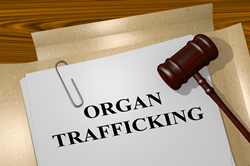
An estimated 5 to 10% of all global organ transplants result from illegal trade in human organs that generates between $840 million and $1.7 billion per year.
Bad things happen and they tend to cast a shadow over the whole transplantation process. In the U.S., however, we have a very strict and tightly regulated allocation system that prevents the issue of unfairness from arising. Every area has a list, and everybody on the list has the same chance.
LAKEWOOD, N.J. (PRWEB)
December 15, 2021
An estimated five to ten percent of all global organ transplants result from illegal trade in human organs that generates between USD $840 million and $1.7 billion per year. In this market, an illicit transplant costs between $50,000 (kidney) and $290,000 (liver), of which the sometimes involuntary donor receives only a small fraction. The underlying cause of this racket, says Sim Shain, CEO of ParaFlight EMS and organflights.com, is that the need for transplants is much greater than the supply of donor organs, causing potential recipients to seek a way to circumvent the rules. “There are bad things that happen,” says Shain, “and they tend to cast a shadow over the whole transplantation process. In the U.S., however, we have a very strict and tightly regulated allocation system that prevents the issue of unfairness from arising. Every geographic area has a list, and everybody on the list has the same chance.”
Elsewhere in the world, he notes, inequities are common. Earlier this year, for example, experts from the United Nations Council reported instances of alleged “organ harvesting” targeting minorities in custody in China, including Falun Gong practitioners, Uyghurs, Tibetans, Muslims, and Christians. In India and other countries, as job losses mount due to the COVID-19 pandemic, desperate people are seeking new ways to make money; evidence points to a resulting deadly surge in illicit organ trafficking. As noted previously, even in the best of times the need for donor organs greatly outstrips the supply. Prior to the pandemic, according to a spokesperson from the World Health Organization, less than 10% of the global need for donations was being met every year.
In the U.S.,all organ donations are managed by the United Network for Organ Sharing (UNOS), a nonprofit organization that contracts with the Department of Health and Human Services to serve as the nation’s organ transplant system. UNOS manages the national transplant waiting list, matching donors to recipients 24 hours per day, 365 days per year. Using a combination of donor and recipient medical data, medical urgency, and location of transplant and donor hospitals, UNOS generates a rank-order list of candidates for each available organ.
In all cases, comments Shain, only medical and logistical data are taken into account; characteristics such as celebrity or wealth do not play a role. Shain also notes that as he operates within the UNOS system, he sees it in action daily. “Every hospital in the country that does transplants is part of the system. Jeff Bezos couldn’t jump the line.”
Meanwhile in the U.S. as in the rest of the world, the need for organ donations far exceeds the supply. Nationally, there are over 100,000 people on the waiting list for an organ transplant. About 36,000 Americans a year receive a life-saving organ transplant. Sadly however, 17 people die each day waiting for a transplant.
“On the transport side of it,” says Shain, “we’re doing everything we can to bring that number down. What matters most to us is getting the organ to the recipient in time to save a life.”
About ParaFlight EMS and Aviation, and Organ Flights
Sim Shain, Founder and CEO of ParaFlight EMS and Aviation, and organflights.com, has led a remarkable 27-year career working in the pre-hospital emergency medical space. He is a noteworthy leader who takes on challenging responsibilities leading corporate, medical, and charity flights and missions specializing in organ transplants. Sim is a devoted volunteer who contributes towards numerous well-known organizations such as Chai Lifeline’s Camp Simcha, United Hatzalah of Israel, The Special Children’s Center, Birthright Israel, and providing Hatzolah EMS, in-flight medical support to children with cancer and disabilities, free of charge. ParaFlight EMS and Aviation and OrganFlights.com personify his lifelong mission of “changing the world, one organ at a time.” For more, visit http://www.paraflight.aero and http://www.organflights.com.
1. Cusack, John. “Why Illegal Trafficking in Organs Is Growing Fast. but Few Are Talking about It.” Financial Crime News, 13 July 2020, thefinancialcrimenews.com/why-illegal-trafficking-in-organs-is-growing-fastbut-few-are-talking-about-itby-steve-farrer/.
2. “China: UN Human Rights Experts Alarmed by ‘Organ Harvesting’ Allegations.” OHCHR, ohchr.org/EN/NewsEvents/Pages/DisplayNews.aspx?NewsID=27167.
3. “Covid-19 a ‘Perfect Storm’ for Organ Trafficking Victims.” SciDev.Net, 5 Oct. 2021, scidev.net/global/features/covid-19-a-perfect-storm-for-organ-trafficking-victims/.
4. “How Are Patients Selected to Receive a Transplant,” Donor Alliance, 23 May, 2017, donoralliance.com/newsroom/donation-essentials
5. “Organ & Tissue Donation Fast Facts,” Gift of Life Donor Program, donors1.org/learn-about-organ-donation/who-can-donate/get-the-facts
Share article on social media or email:

